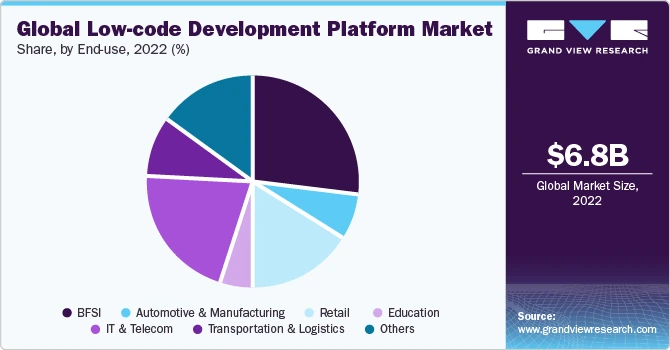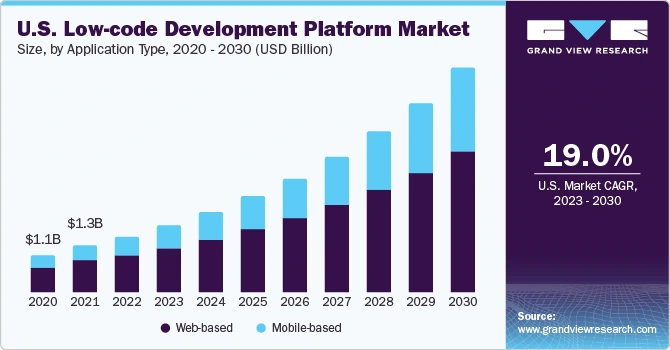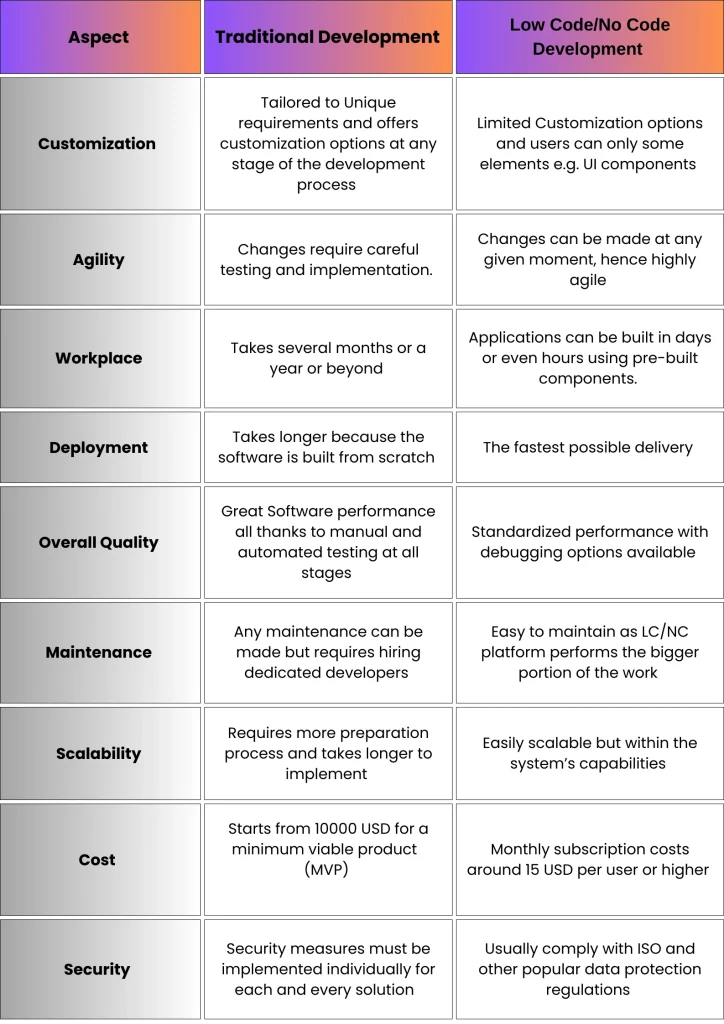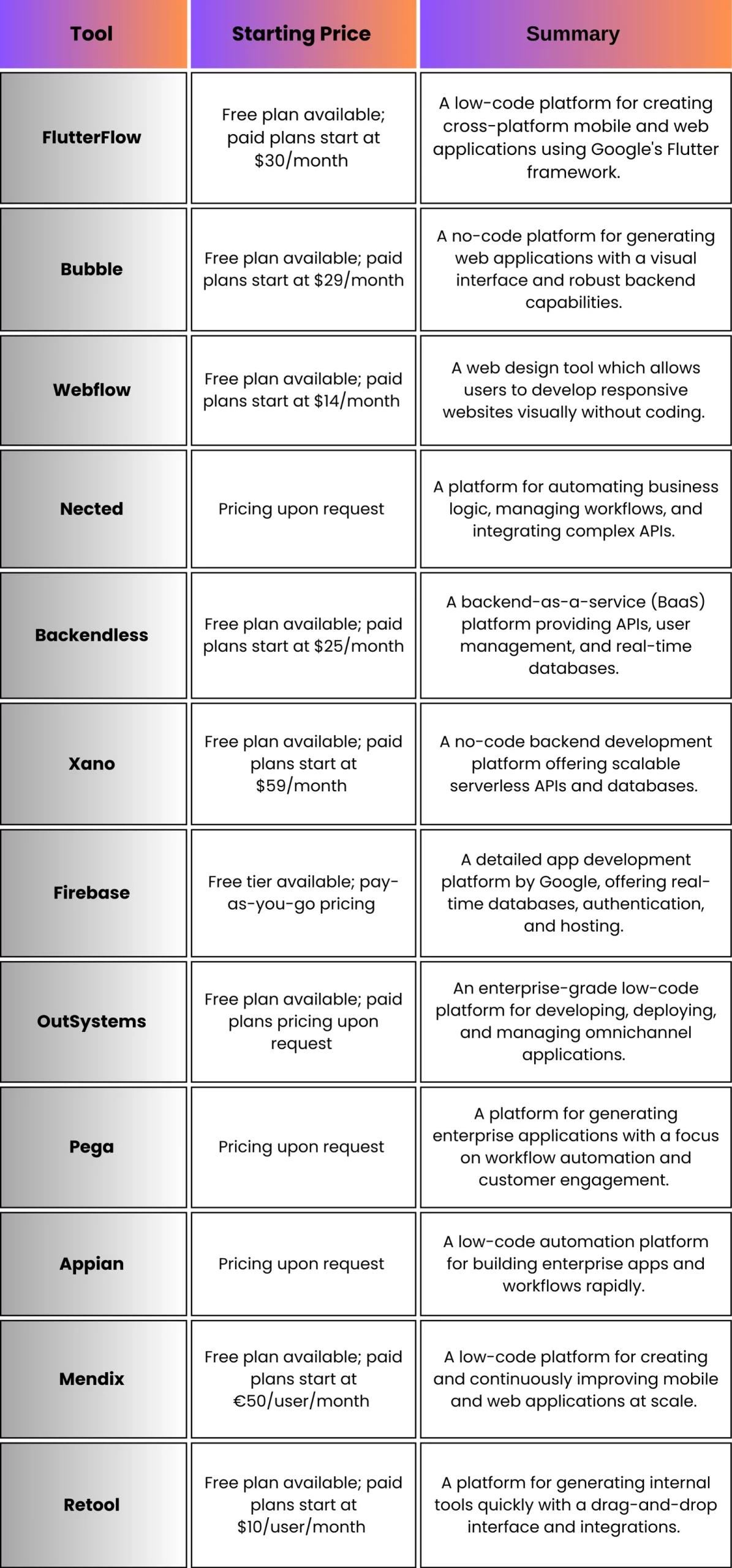
-
Apexlink
Real Estate
-
DLS
General Insurance
-
DMV
Government
-
Entiger
Fintech
-
GIS Mapping
Gas & Petroleum
-
HMS
Employee Benefit
-
HAWA
Government
-
Harley
Community
-
IHG
Hotel & Tourism
-
Sparkseeker
Humane Tech
-
Track Ninja
Sports
-
Response Vision
Disaster Management
- Artificial Intelligence
- Application Services
- Automation Services
- Cyber Security
- Chatbot Experts
- Data Analysis
- Data Warehouse Services
- Machine Learning
- Digital Commerce Services
- Digital Transformation
- Infrastructure Service
- IT Support
- IT Consulting
- IT Outsourcing
- IOS Development
- Android Development
-
Cross Platform Development
-
Gaming App Development
The world is rapidly evolving through digital transformation, and businesses are constantly seeking faster and more efficient ways to build and deploy applications. Could low-code no-code app development be the answer to bridging the gap between innovation and accessibility?
Let’s find out!
What is Low Code No Code, and Why are LCNC Platforms Gaining Immense Popularity?
Low-code and no-code platforms empower businesses to develop applications using a visual, drag-and-drop interface, reducing the need for traditional hand-coding. Although low-code and no-code software development work best when combined, there are several differences between them. In fact, they cannot be used interchangeably.
Low-code development allows developers to select and integrate pre-built code blocks to build applications, websites, or functionalities with minimal coding effort. Low-code development platforms demand a certain level of coding but make it easy for developers to develop new apps as quickly as possible.
No-code platforms enable users without any coding experience to assemble applications using functional, reusable building blocks. When no-code and low-code work together, they enable rapid application development, which aids businesses in reaching their objectives even with very limited resources.
The demand for software solutions is growing exponentially, but the supply of skilled developers isn’t keeping up. Low-code and no-code platforms bridge this gap by enabling faster development and empowering business users to create applications independently. Organizations across industries use these tools to enhance efficiency, reduce costs, and drive digital transformation. The following are some statistics that showcase the opportunities for Low-Code and No-Code Application Development as the code for the future.
a.The low-code development market is projected to reach $187 by 2030, with low-code tools powering over 65% of application development by 2024. By the end of 2025, over 500 million apps and services will be developed using cloud-native approaches.

b.According to Research and Markets, the global low-code development platform market is estimated to create a revenue of $187.0 billion by 2030, rising from $10.3 billion in 2019, and is expected to advance at a fast pace, 31.1% CAGR, during 2020-2030.
c.As per Mendix survey, 70 percent of the developers with no programming background learned to build applications with low code platform in one month of time duration and 28% learned in just two weeks or less.
d.The global low-code platform market is estimated to amount to approximately 65 billion U.S. dollars by 2027.
Low-code development platform market revenue worldwide from 2020 to 2030


How Does Low-Code and No-Code Work?
Low-code and no-code platforms simplify software development by allowing users to build applications without advanced programming skills.
With the use of an ultra-simplified interface, this type of platform enables a fast and accessible learning curve for beginners. Generally, it is a block system that is proposed with a drag and drop assembly. This way, the user will have a direct view of the way they are creating. It is thus possible to create the desired interface in a very simplified way.
Blocks, widgets, templates and other plugins are stored safely in a library. This allows you to reuse them endlessly and adjust as soon as necessary.
Traditional software development and low code no code app development are fundamentally very different approaches, here is a comparison table that highlights their distinctive features.

How are businesses utilizing LCNC platforms for app Development?
According to a recent Gartner survey, LCNC platforms will be employed in more than 65% of application developments worldwide by 2024. This comes with an increase of 165% projected growth rate every two years. As more businesses start to use LCNC tools, the number and sophistication of citizen users quickly increases as a result of people realizing the advantages of fast and accurate app development across almost any area of any business. A recent analysis show that over 7,000 businesses employ LCNC platforms, and out of the 187 S&P-listed companies utilizing these platforms, 20% are Information Technology companies, 16% are Financial, and 15% are Healthcare.
The following are some examples:
Real Estate
Your success in the real estate sector depends on effective property management, client communication, and data analysis. Low code no code app development helps create property listing platforms, CRM systems, and analytics dashboards to help streamline real estate operations and improve client engagement.
Logistics & Supply Chain
Logistics and supply chain delays can adversely affect stable economies and weaken businesses. These companies are turning to LCNC technology to build tools that assist them with addressing bottlenecks. Citizen developers use LCNC tools to automate processes, improve visibility, and increase productivity. Low code no code app development integrates legacy systems, and partially or fully automate most supply chain tasks including managing assets and contracts, tracking goods and inventory, invoicing, and compliance adherence.
Healthcare
Most legacy healthcare applications like Electronic Health Record (EHR) systems have isolated architecture. LCNC platforms energize doctors, nurses, and other healthcare professionals to contribute to creating an integrated patient experience. LCNC platforms enable seamless integration of custom electronic health record systems with telehealth solutions and IoT healthcare devices.
Manufacturing
Most manufacturing companies still utilize legacy systems that may not support integration with other core systems. It makes data sharing or collaboration quite difficult. LCNC platforms eliminate information departments and remove process bottlenecks by connecting systems together. These platforms are gaining popularity among manufacturers as they empower floor teams to address problems in real-time. Manufacturing enterprises generate LCNC applications to connect teams working at multiple locations and track workloads at different facilities. With low code no code application development, one can effectively communicate design changes to floor teams, automate repetitive tasks, and harness the potential of emerging technologies like the Internet of Things (IoT).
Information Technology
Professional developers employ low-code platforms to speed up the development process. Low-code platforms like Joget, a platform recognized in Forrester’s Now Tech Q1 2021 report, support smooth deployment, scalability, and security features. Professional developers utilize low code to modernize legacy apps, prototype solutions and much more. These platforms reduce the development to release cycle from months to just weeks.
Accounting, Finance & Fintech
Low code no code applications development reduces time-consuming paperwork in accounting and fintech sectors. These platforms are instrumental in streamlining operations as they free employees from repetitive tasks such as maintaining multiple spreadsheets. Financial institutions, fintech startups, and accounting firms utilize LCNC platforms to create unique workflows, automate loan approvals, conduct risk assessments, and manage dispute-handling processes efficiently.

Top Rated Low Code No Code Development Platforms
LCNC platforms are greatly transforming application development that enables customized software solutions with minimal coding skills. Below is a curated list of top LCNC platforms that offer visual interfaces and pre-built components for faster mobile app development. This makes the development process more efficient and cuts the time to launch an application product.

Note: Pricing details are subject to change. For the latest information, please visit the respective websites.
Key Benefits of Low-Code and No-Code Platforms
Numerous benefits together have led to a rise in the LCAD and NCAD form of rapid application development. The following section discusses them in detail:
High Development Speed
One of the biggest advantages of LCNC development is the drastic reduction in development time—from months to days. As a result, you can take your app to the market faster and quickly work on the user feedback and add newer features and functionalities.
Lowered Cost
With reduced development time, faster deployment, and minimal resource requirements, low-code/no-code app development significantly lowers overall costs.
Lesser Bugs
The less amount of code leads to fewer bug occurrences. With fewer bugs present, the development time gets further reduced by manifold.
Better Business Stakeholder Engagement
The inclusion of in-house developers in the low code no code database application development helps the stakeholders be involved in the deployment process.
Multiple Deployments
Low code development platform enables businesses to build apps for multiple platforms at the same time. What typically requires complex effort can now be streamlined into a more efficient process.
Challenges and Limitations of Low Code No Code App Development
Reduced Flexibility
While LCNC platforms accelerate development, they may limit advanced customizations due to rigid frameworks and restricted source code access.
Solution: Businesses can receive specialized low-code solutions through Seasia Infotech that expand past restricted features found within LCNC systems. Our team of expert developers inserts necessary coding functions that enhance personalized features into the system.
Security Risk Concerns
Relying on third-party LCNC platforms can expose businesses to security vulnerabilities—especially in cases of provider outages or breaches. Safeguarding applications and data necessitate thoughtful consideration and evaluation of security measures.
Solution: Seasia puts security first by activating strong encryption standards together with access governance and regulatory compliance procedures. An expert team at our company ensures complete data protection for users who access third-party LCNC platforms.
Performance Considerations
In complex use cases, LCNC platforms may fall short in performance when compared to fully custom-coded applications.
Solution: Seasia Infotech implements workflow improvements together with high-performance system features to optimize their Low code no code applications. Our team streamlines ownership of your applications to operate smoothly for comprehensive business activities.
Scalability Issues
Scalability problems may arise in LCNC applications because of limitations in adjusting underlying infrastructure or merging with existing systems. As businesses grow, LCNC applications can face scalability issues due to rigid templates and vendor lock-in.
Solution: Our experts enable business growth of LCNC applications through their work in flexible architecture design and deployment of cloud solutions. The system enables your application to scale into unlimited growth without dependence on specific vendors.

The Future of Low-Code and No-Code Development
LCNC platforms’ future looks quite promising with significant growth and adoption projected across industries. According to Gartner and Forrester, by the end of 2025, 70% of new applications will utilize these technologies, which is nearly triple of what it was in 2020.
LCNC platforms meet the increasing demand for rapid development and deployment that empowers citizen developers to contribute to create digital solutions alongside traditional developers. This partnership will optimize the development process and enable businesses to innovate more efficiently.
As LCNC platforms expand further, they are becoming essential in software development. Continued enhancements in scalability, security, and integration will further strengthen their influence in shaping the future of digital innovation. By sticking to optimal methods, companies can multiply the benefits of LCNC to adjust and succeed in the constantly changing digital environment.
Does the Future Lie in Low Code No Code?
If you intend to develop basic applications that require little to zero personalization and arrive with low-security vulnerability, it is recommended to go for the low code no code app development approach with the best low code app developer. On the other hand, if your business goal is to enter the mobile app market domain with a high-quality successful product customized application development would work in your favor.
Regardless of what you choose the future of application development as opposed to general belief does not lie in no code low code mobile app development company approach. The key to achieving a competitive edge will need businesses to present a personalized stand in the industry while making sure that they have full control over the backend and users' data.
For the same, one must refer to an on-demand agency or an app development company in USA to bring modern development for a new support system. It will definitely become a stable tool for the employees to draw on to be more effective inside or outside the office.

FAQs
1.What is low-code and no-code app development?
Low-code and no-code app development helps develop apps with little or no coding. Low-code needs some coding, while no-code uses drag-and-drop tools without coding. Both make app development faster and easier.
2.Can you build an app with no-code?
Yes, you can build an app with no-code. No-code platforms use drag-and-drop tools to create apps without coding. They are easy to use and help businesses build apps quickly.
3.Will low-code no-code replace developers?
No, low-code and no-code will not replace developers. They help build apps faster, but complex projects still need skilled developers. Instead of replacing them, these tools make their work easier and faster.
4.Is no-code app development good?
Yes, no-code app development is good for simple and quick apps. It saves time, reduces costs, and is easy to use. However, it may not be suitable for complex apps with advanced features.







 Artificial Intelligence
Artificial Intelligence
 Blockchain
Blockchain Cloud Computing
Cloud Computing Infrastructure
Services
Infrastructure
Services Metaverse
Metaverse QA
Automation
QA
Automation UI/UX
UI/UX








